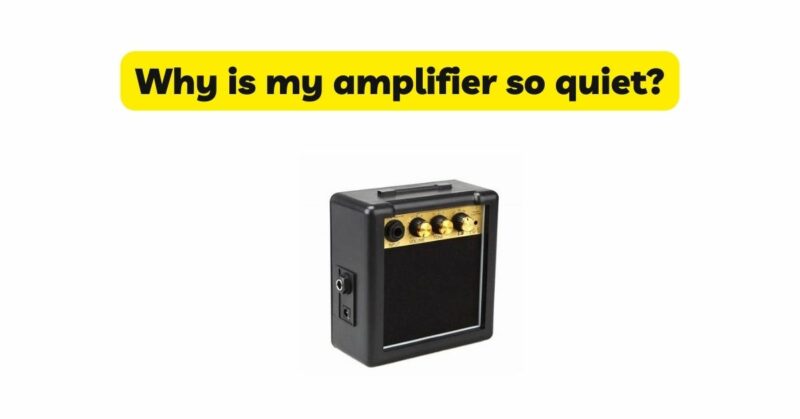Encountering a quiet amplifier can be a perplexing and frustrating experience, hindering your ability to enjoy your music or fully express yourself as a musician. Several factors can contribute to a quiet amplifier, ranging from technical issues to incorrect settings and external influences. In this article, we will explore the common reasons why your amplifier may sound quiet and provide insights into troubleshooting and resolving the issue. By understanding these factors and implementing the appropriate solutions, you can restore your amplifier’s volume and reclaim the powerful sound it is capable of producing.
- Technical Issues: a. Faulty Tubes: In tube amplifiers, worn-out or faulty tubes can lead to reduced amplification and a decrease in volume. Consider replacing the tubes with new ones to restore optimal performance. b. Speaker Problems: Damaged or worn-out speakers may not efficiently reproduce sound, resulting in a lower volume output. Inspect the speakers for any signs of damage and consider replacing them if necessary. c. Input Jack or Connections: Loose or faulty input jacks, cables, or other connections can lead to signal loss and a decrease in volume. Ensure all connections are secure and in good condition.
- Amplifier Settings: a. Volume and Gain Controls: Ensure that the volume and gain controls are set appropriately for your desired volume level. Increasing these settings can boost the overall volume output of the amplifier. b. Master Volume: Some amplifiers feature a separate master volume control. Adjust it to an appropriate level to allow for maximum output without introducing distortion or compromising sound quality. c. EQ and Tone Controls: Incorrectly adjusted EQ and tone controls can affect the perceived volume. Experiment with different settings to find the optimal tonal balance without sacrificing volume.
- Guitar and Cable Considerations: a. Pickup Output: Low-output pickups may not provide sufficient signal strength to drive the amplifier to its full potential. Consider upgrading to higher-output pickups to increase volume and enhance overall sound. b. Cable Quality: Poor-quality cables can introduce signal loss and diminish volume. Ensure you are using high-quality cables with proper shielding and check for any cable defects or damage.
- Power Supply: a. Insufficient Power: Inadequate power supply can limit the amplifier’s output volume. Ensure you are using an appropriate power source that meets the amplifier’s requirements and provides consistent power. b. Fuse Issues: A blown fuse can result in reduced volume or no sound at all. Check the amplifier’s fuse and replace it if necessary.
- Room Acoustics: a. Sound Absorption: Rooms with highly absorbent surfaces can dampen sound waves and reduce volume. Consider adding reflective surfaces or using acoustic treatment to improve room acoustics and enhance volume. b. Standing Waves: Standing waves caused by room dimensions can create volume inconsistencies. Experiment with the placement of your amplifier and listening position to minimize the effects of standing waves.
- External Interference: a. Environmental Factors: External noises or interference from nearby electrical devices can impact the perceived volume. Minimize sources of interference or relocate your amplifier to a quieter environment.
- Personal Hearing Perception: a. Hearing Loss or Sensitivity: Individual hearing conditions can affect the perceived volume. If you suspect hearing issues, consult a professional for evaluation and guidance.
Conclusion: Encountering a quiet amplifier can be a frustrating experience, but with a systematic approach to troubleshooting and problem-solving, you can identify and address the underlying causes. By examining technical issues, adjusting amplifier settings, considering guitar and cable choices, ensuring an adequate power supply, optimizing room acoustics, minimizing external interference, and accounting for personal hearing perception, you can restore the volume and enjoy the full potential of your amplifier. Remember to approach the troubleshooting process with patience and an open mind, and don’t hesitate to seek professional assistance if needed. With careful attention to these factors and diligent implementation of the appropriate solutions, you can resolve the issue of a quiet amplifier, ensuring a powerful and immersive sound experience for your musical endeavors.


